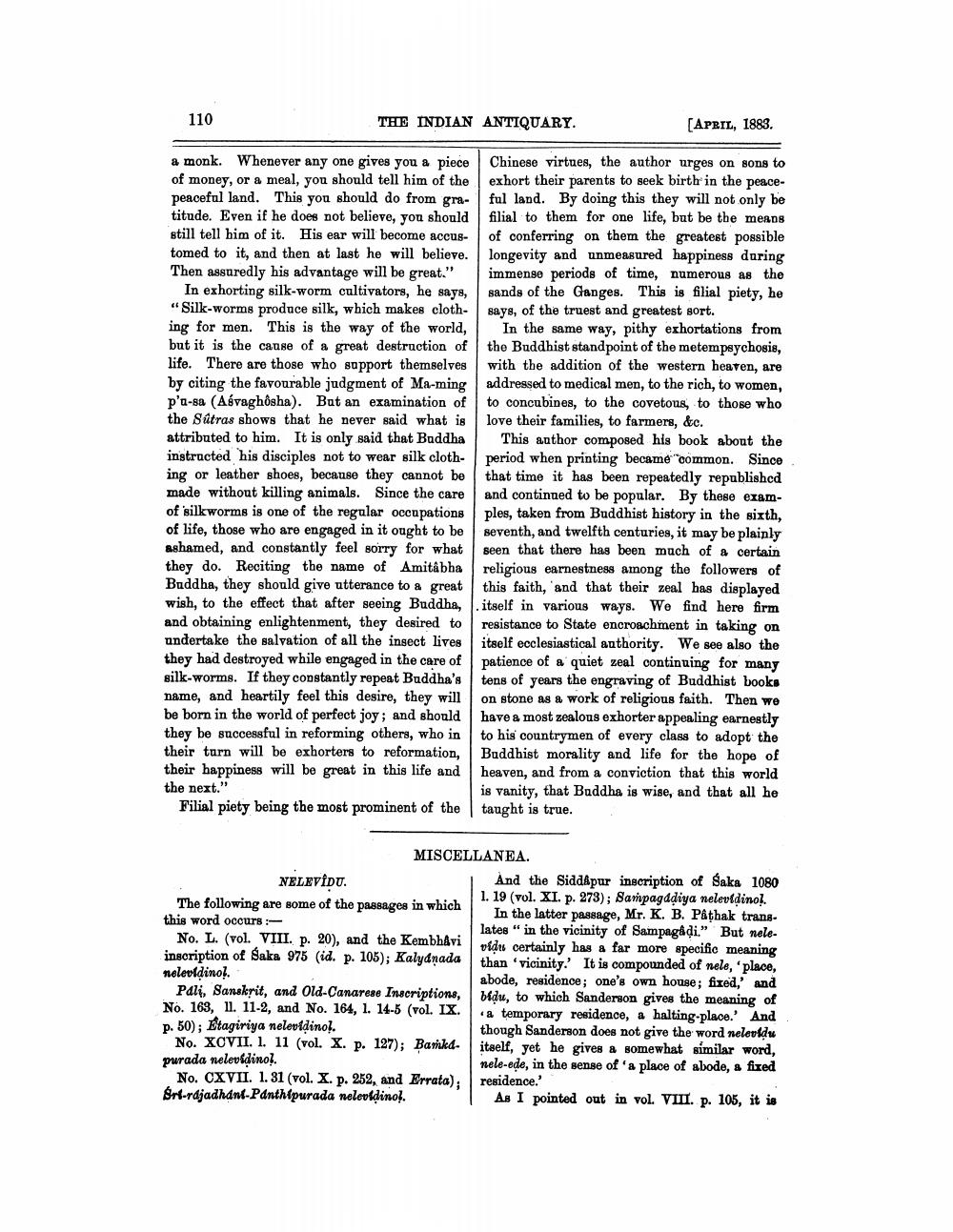________________
110
THE INDIAN ANTIQUARY.
[APRIL, 1883
a monk. Whenever any one gives you a piece Chinese virtues, the author urges on sons to of money, or a meal, you should tell him of the exhort their parents to seek birth in the peacepeaceful land. This you should do from gra- ful land. By doing this they will not only be titude. Even if he does not believe, you should filial to them for one life, but be the means still tell him of it. His ear will become accus- of conferring on them the greatest possible tomed to it, and then at last he will believe. longevity and unmeasured happiness during Then assuredly his advantage will be great." immense periods of time, numerous as the
In exhorting silk-worm cultivators, he says, sands of the Ganges. This is filial piety, he "Silk-worms produce silk, which makes cloth- says, of the truest and greatest sort. ing for men. This is the way of the world, In the same way, pithy exhortations from but it is the cause of a great destruction of the Buddhist standpoint of the metempsychosis, life. There are those who support themselves with the addition of the western heaven, are by citing the favourable judgment of Ma-ming addressed to medical men, to the rich, to women, p'a-sa (Asvaghôsha). But an examination of to concubines, to the covetons, to those who the Sútras shows that he never said what is love their families, to farmers, &c. attributed to him. It is only said that Buddha This author composed his book about the instructed his disciples not to wear silk cloth- period when printing became common. Since ing or leather shoes, because they cannot be that time it has been repeatedly republished made without killing animals. Since the care and continued to be popular. By these examof silkworms is one of the regular occupations ples, taken from Buddhist history in the sixth, of life, those who are engaged in it ought to be seventh, and twelfth centuries, it may be plainly ashamed, and constantly feel sorry for what seen that there has been much of a certain they do. Reciting the name of Amitabha religious earnestness among the followers of Buddha, they should give utterance to a great this faith, and that their zeal has displayed wish, to the effect that after seeing Buddha, . itself in various ways. We find here firm and obtaining enlightenment, they desired to resistance to State encroachment in taking on undertake the salvation of all the insect lives itself ecclesiastical authority. We see also the they had destroyed while engaged in the care of patience of a quiet zeal continuing for many silk-worms. If they constantly repeat Buddha's tens of years the engraving of Buddhist books name, and heartily feel this desire, they will on stone as a work of religious faith. Then we be born in the world of perfect joy; and should have a most zealous exhorter appealing earnestly they be successful in reforming others, who in to his countrymen of every class to adopt the their turn will be exhorters to reformation, Buddhist morality and life for the hope of their happiness will be great in this life and heaven, and from a conviction that this world the next.
is vanity, that Buddha is wise, and that all he Filial piety being the most prominent of the taught is true.
MISCELLANEA. NELEVİDU.
And the Siddapur inscription of Saka 1080
1. 19 (vol. XI. p. 273); Sampagddiya nelevidinol The following are some of the passages in which
In the latter passage, Mr. K. B. Pathak transthis word occurs :
lates " in the vicinity of Sampagkdi." But neleNo. L. (vol. VIII. p. 20), and the Kembh&vi
vidis certainly has a far more specific meaning inscription of Saka 975 (id. p. 105); Kalydnada than 'vicinity. It is compounded of nele, 'place, nelevidino!
abode, residence; one's own house; fixed,' and Pali, Sanskrit, and Old-Canareso Inscriptions, bidu, to which Sanderson gives the meaning of No. 163, 11. 11-2, and No. 164, 1. 14-5 (vol. IX.
a temporary residence, a halting-place. And p. 50); Etagiriya nelevidinol.
though Sanderson does not give the word nelevldu No. XOVII. 1. 11 (vol. X. p. 127); Bankd. itself, yet he gives a somewhat similar word, purada nelevidinol
nele-ede, in the sense of a place of abode, a fixed No. CXVII. 1. 31 (vol. X. p. 252, and Errata), residence. Sri-rajadhani-Panthipurada nelevidinol.
As I pointed out in vol. VIII. p. 105, it is




